人教版(2019)必修 第三册Unit 2 Morals and Virtues课件(22张ppt)
文档属性
| 名称 | 人教版(2019)必修 第三册Unit 2 Morals and Virtues课件(22张ppt) | 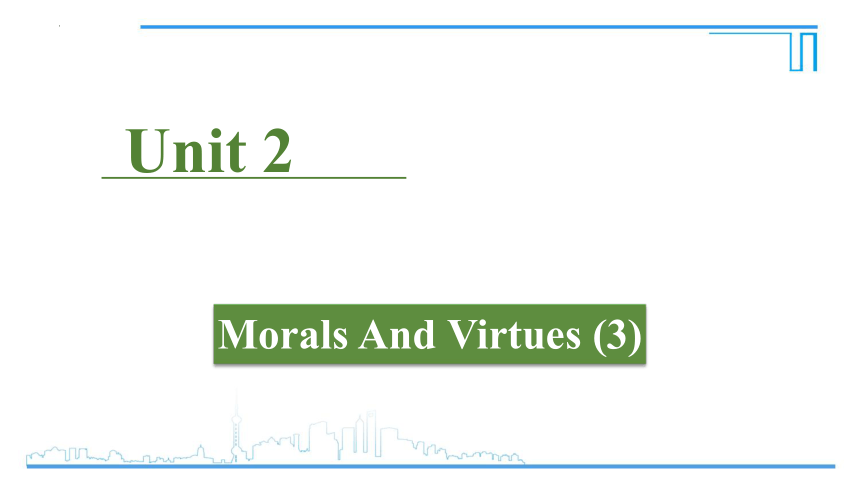 | |
| 格式 | pptx | ||
| 文件大小 | 204.7KB | ||
| 资源类型 | 教案 | ||
| 版本资源 | 人教版(2019) | ||
| 科目 | 英语 | ||
| 更新时间 | 2022-03-10 23:26:50 | ||
图片预览

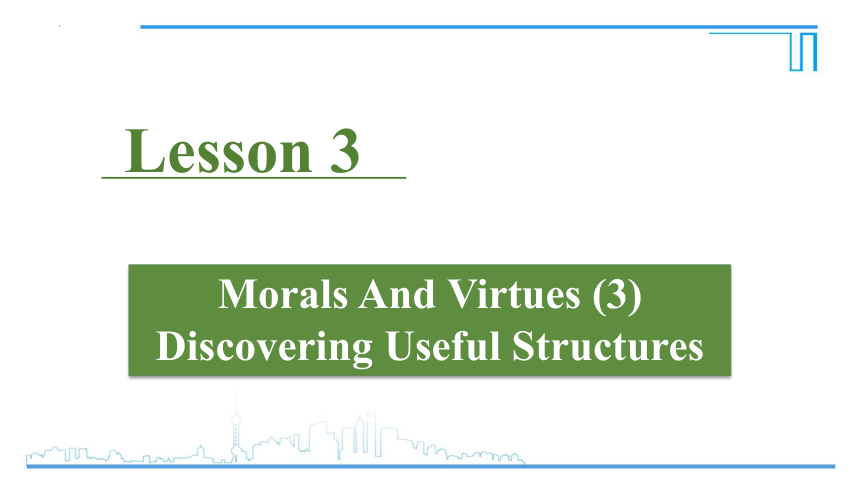
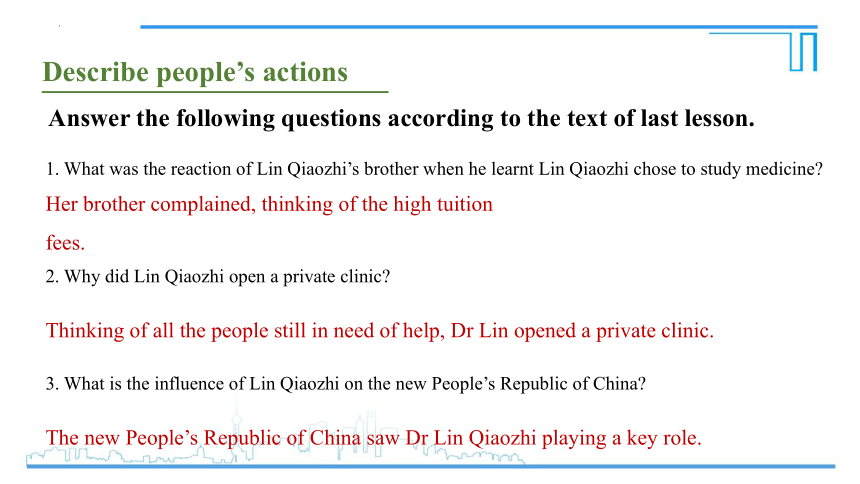
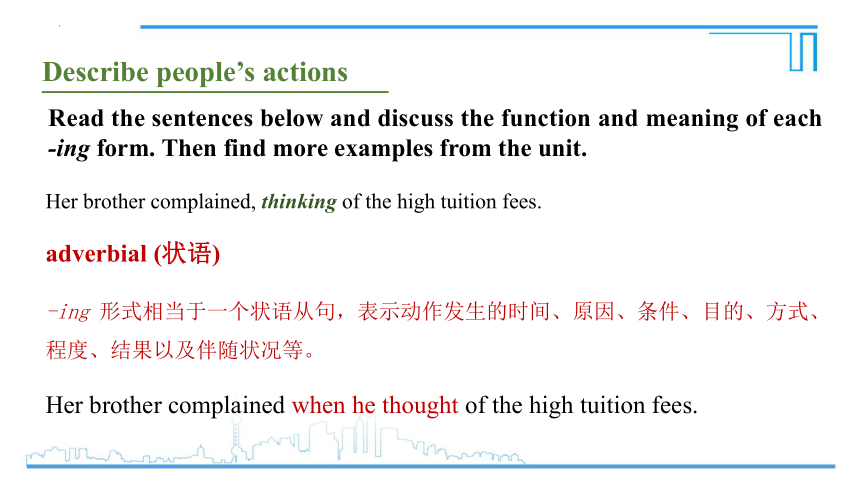
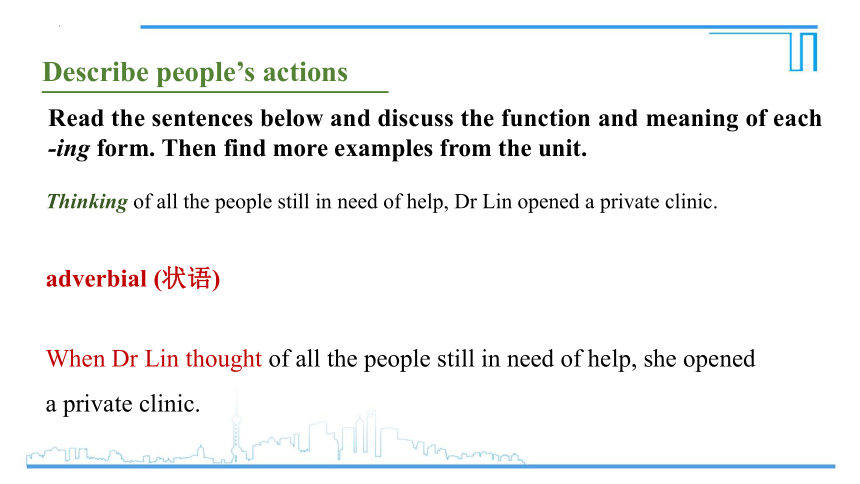
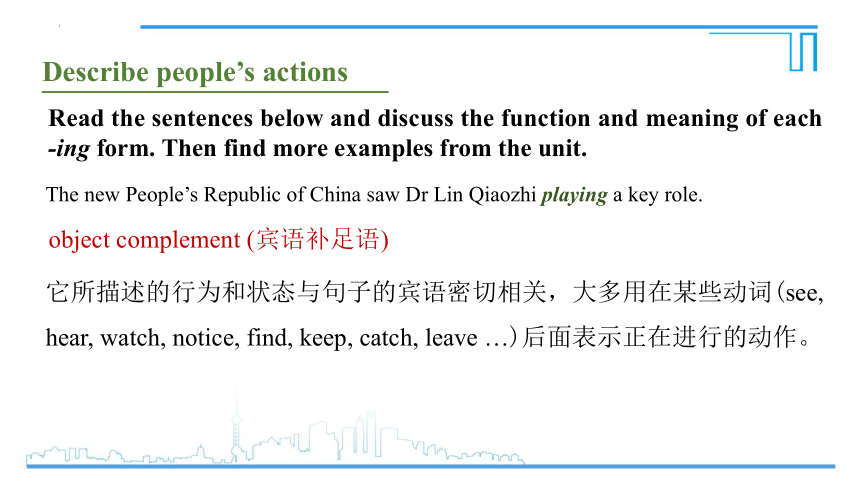
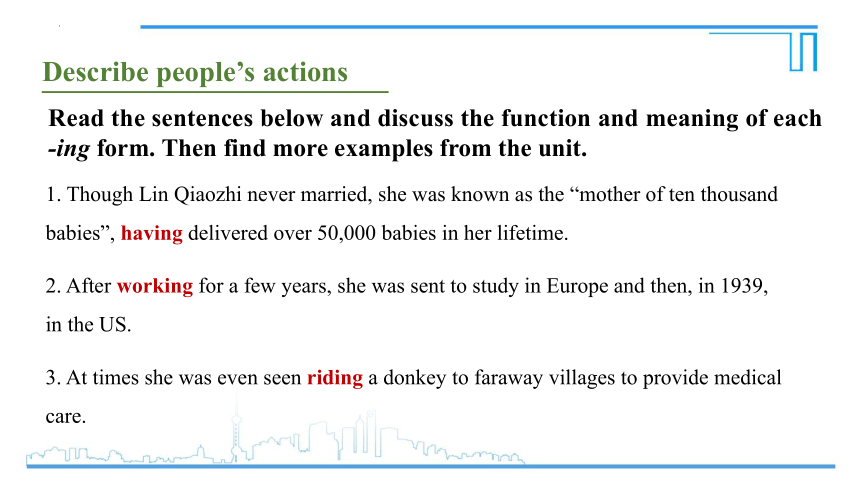
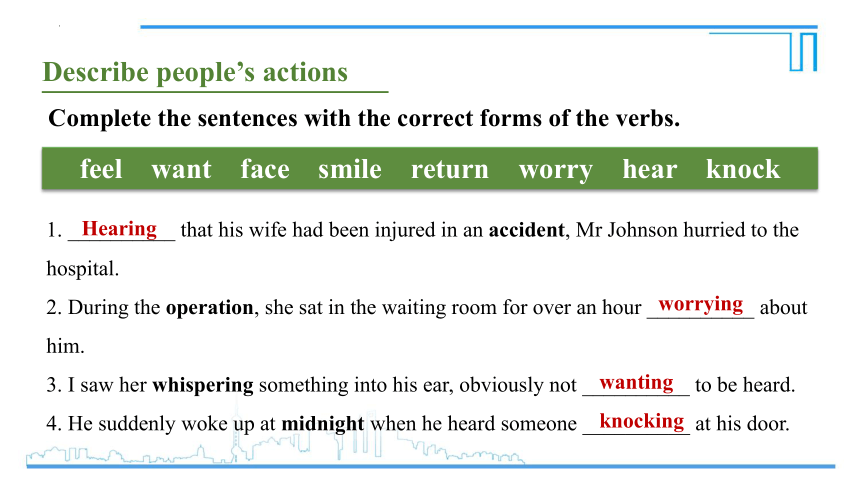
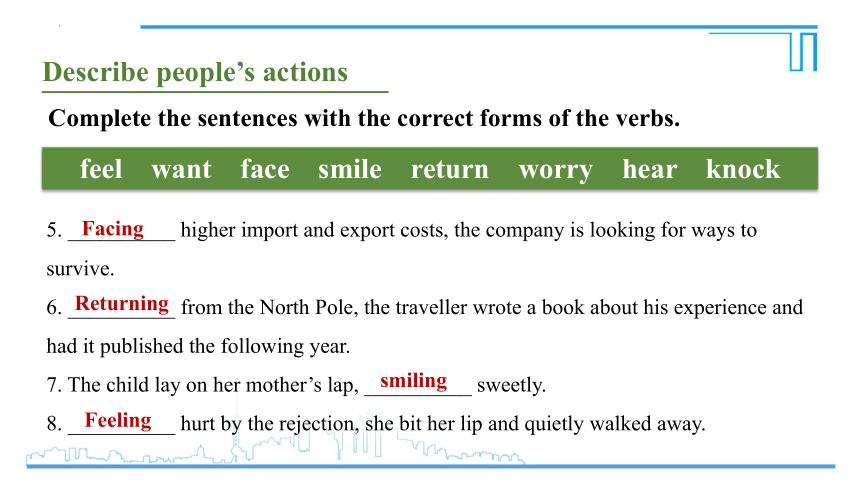
文档简介
(共22张PPT)
Unit 2
Morals And Virtues (3)
Lesson 3
Morals And Virtues (3)
Discovering Useful Structures
Describe people’s actions
Answer the following questions according to the text of last lesson.
1. What was the reaction of Lin Qiaozhi’s brother when he learnt Lin Qiaozhi chose to study medicine
2. Why did Lin Qiaozhi open a private clinic
3. What is the influence of Lin Qiaozhi on the new People’s Republic of China
Her brother complained, thinking of the high tuition fees.
Thinking of all the people still in need of help, Dr Lin opened a private clinic.
The new People’s Republic of China saw Dr Lin Qiaozhi playing a key role.
Describe people’s actions
Read the sentences below and discuss the function and meaning of each -ing form. Then find more examples from the unit.
Her brother complained, thinking of the high tuition fees.
adverbial (状语)
-ing 形式相当于一个状语从句,表示动作发生的时间、原因、条件、目的、方式、程度、结果以及伴随状况等。
Her brother complained when he thought of the high tuition fees.
Describe people’s actions
Read the sentences below and discuss the function and meaning of each -ing form. Then find more examples from the unit.
Thinking of all the people still in need of help, Dr Lin opened a private clinic.
adverbial (状语)
When Dr Lin thought of all the people still in need of help, she opened a private clinic.
Describe people’s actions
Read the sentences below and discuss the function and meaning of each -ing form. Then find more examples from the unit.
The new People’s Republic of China saw Dr Lin Qiaozhi playing a key role.
object complement (宾语补足语)
它所描述的行为和状态与句子的宾语密切相关,大多用在某些动词(see, hear, watch, notice, find, keep, catch, leave …)后面表示正在进行的动作。
Describe people’s actions
Read the sentences below and discuss the function and meaning of each -ing form. Then find more examples from the unit.
1. Though Lin Qiaozhi never married, she was known as the “mother of ten thousand babies”, having delivered over 50,000 babies in her lifetime.
2. After working for a few years, she was sent to study in Europe and then, in 1939, in the US.
3. At times she was even seen riding a donkey to faraway villages to provide medical care.
Describe people’s actions
Complete the sentences with the correct forms of the verbs.
1. __________ that his wife had been injured in an accident, Mr Johnson hurried to the hospital.
2. During the operation, she sat in the waiting room for over an hour __________ about him.
3. I saw her whispering something into his ear, obviously not __________ to be heard.
4. He suddenly woke up at midnight when he heard someone __________ at his door.
feel want face smile return worry hear knock
Hearing
worrying
wanting
knocking
Describe people’s actions
Complete the sentences with the correct forms of the verbs.
5. __________ higher import and export costs, the company is looking for ways to survive.
6. __________ from the North Pole, the traveller wrote a book about his experience and had it published the following year.
7. The child lay on her mother’s lap, __________ sweetly.
8. __________ hurt by the rejection, she bit her lip and quietly walked away.
feel want face smile return worry hear knock
Facing
Returning
smiling
Feeling
Describe people’s actions
Complete the conversations using the correct forms of the words in brackets.
1. A: You look really __________ (tire). You should go home and have a rest.
B: Yes, well, a five-hour operation is pretty __________ (tire).
2. A: Did you hear that Susan and Bob got married
B: Really That’s the most __________ (shock) news I have heard today.
3. A: Harry, you forgot to return my phone call last night!
B: Oh, I’m very sorry. I went to sleep __________ (listen) to music.
4. A: How can you sit inside __________ (play) games all day Isn’t there anything more important you can do with your time
B: Come on, Mum. It’s a holiday.
tired
tiring
shocking
listening
playing
Describe people’s actions
Complete the conversations using the correct forms of the words in brackets.
5. A: The museum was __________ (interest), wasn’t it
B: It was great. I was quite __________ (interest) in those ancient pieces of jade.
6. A: Are you sure this is the man you saw that night
B: That’s right. From my window, I saw him __________ (come) into the building.
A: Did you hear a gunshot after that
B: No, but I heard people __________ (shout) downstairs.
A: What did you see when you came down
B: I saw an injured man __________ (lie) on the floor.
interesting
interested
coming
shouting
lying
Read the story and think about the following questions.
Henry Norman Bethune was a Canadian doctor with a very creative mind and a determination to help people. As a small boy, he became very interested in medicine and decided to become a doctor. After he graduated from medical college in 1916, Bethune worked as a doctor in England, the US, and Canada. He reinvented or redesigned over 10 medical instruments to make them more useful. In 1938, Bethune left for China, after he heard that many people were dying in the war. Despite the difficult situation, Dr Bethune did whatever he could to assist the Chinese people. He helped to organise hospitals, taught doctors and nurses, and showed people how to give first aid. Sadly, Dr Bethune passed away in November the following year and was buried in Shijiazhuang. After Dr Bethune’s death, Chairman Mao Zedong wrote an article in memory of him, in which he praised Dr Bethune as a hero to be remembered in China.
Describe people’s actions
Read the story and think about the following questions.
1. Why did Dr Bethune come to China
2. How did he help the Chinese people during the war
3. What did Chairman Mao Zedong say about him
Chairman Mao Zedong wrote an article in memory of him, in which he praised Dr Bethune as a hero to be remembered in China.
Because he heard that many people were dying in the war.
He helped to organise hospitals, taught doctors and nurses, and showed people how to give first aid.
Complete the sentences with the correct forms of the verbs.
Henry Norman Bethune was a Canadian doctor with a very creative mind and a determination to help people. As a small boy, he became very interested in medicine and decided to become a doctor. After he graduated from medical college in 1916, Bethune worked as a doctor in England, the US, and Canada. He reinvented or redesigned over 10 medical instruments to make them more useful. In 1938, Bethune left for China, after he heard that many people were dying in the war. Despite the difficult situation, Dr Bethune did whatever he could to assist the Chinese people. He helped to organise hospitals, taught doctors and nurses, and showed people how to give first aid. Sadly, Dr Bethune passed away in November the following year and was buried in Shijiazhuang. After Dr Bethune’s death, Chairman Mao Zedong wrote an article in memory of him, in which he praised Dr Bethune as a hero to be remembered in China.
Complete the sentences with the correct forms of the verbs.
As a small boy, he became very interested in medicine and decided to become a doctor.
2. In 1938, Bethune left for China, after he heard that many people were dying in the war.
As a small boy, he became very interested in medicine, deciding to become a doctor.
In 1938, Bethune left for China, after hearing that many people were dying in the war.
Complete the sentences with the correct forms of the verbs.
3. He helped to organise hospitals, taught doctors and nurses, and showed people how to give first aid.
4. Chairman Mao Zedong wrote an article in memory of him, in which he praised Dr Bethune as a hero to be remembered in China.
He helped to organise hospitals, teaching doctors and nurses, and showing people how to give first aid.
Chairman Mao Zedong wrote an article in memory of him, praising Dr Bethune as a hero to be remembered in China.
Describe people’s actions
Rewrite the following sentences using the –ing form or the past participle as the adverbial. (P69/Ex2)
1. Because I did not know anyone, I sat alone in my seat for two hours.
2. Although Joe was upset by the reporter’s words, he responded to his questions politely.
Not knowing anyone, I sat alone in my seat for two hours.
Although upset by the reporter’s words, Joe responded to his questions politely.
Example
Describe people’s actions
Rewrite the following sentences using the –ing form or the past participle as the adverbial. (P69/Ex2)
1. As she was frightened by the noise, Amy turned on all the lights in the house.
2. While they were driving along the freeway, they noticed a kangaroo standing in the middle of the road.
Frightened by the noise, Amy turned on all the lights in the house.
While driving along the freeway, they noticed a kangoroo standing in the middle of the road.
Describe people’s actions
Rewrite the following sentences using the –ing form or the past participle as the adverbial. (P69/Ex2)
3. After we watched the movie for ten minutes, we felt so bored that we decided to leave.
4. As I came out of my house, I saw the volcano erupting(爆发).
5. After she turned fifteen, she became interested in travelling.
After watching the movie for ten minutes, we felt so bored that we decided to leave.
Coming out of my house, I saw the volcano erupting.
After turning fifteen, she became interested in travelling.
Describe people’s actions
Rewrite the following sentences using the –ing form or the past participle as the adverbial. (P69/Ex2)
6. Because she didn’t want to be late, Sally ran to the subway station.
7. Tim was feeling tired, so he went to bed as soon as he got home.
8. After he gathered all his courage, he ran back into the burning house to rescue the child.
Not wanting to be late, Sally ran to the subway station.
Feeling tired, Tim went to bed as soon as he got home.
Gathering all his courage, he ran back into the burning house to rescue the child.
Summary
Functions of the –ing form:
The attribute
The predicative.
The adverbial.
The object complement.
Homework
Review the usage of the –ing form.
Read the text of Henry Norman Bethune aloud.
Finish exercise 3 on page 69.
Unit 2
Morals And Virtues (3)
Lesson 3
Morals And Virtues (3)
Discovering Useful Structures
Describe people’s actions
Answer the following questions according to the text of last lesson.
1. What was the reaction of Lin Qiaozhi’s brother when he learnt Lin Qiaozhi chose to study medicine
2. Why did Lin Qiaozhi open a private clinic
3. What is the influence of Lin Qiaozhi on the new People’s Republic of China
Her brother complained, thinking of the high tuition fees.
Thinking of all the people still in need of help, Dr Lin opened a private clinic.
The new People’s Republic of China saw Dr Lin Qiaozhi playing a key role.
Describe people’s actions
Read the sentences below and discuss the function and meaning of each -ing form. Then find more examples from the unit.
Her brother complained, thinking of the high tuition fees.
adverbial (状语)
-ing 形式相当于一个状语从句,表示动作发生的时间、原因、条件、目的、方式、程度、结果以及伴随状况等。
Her brother complained when he thought of the high tuition fees.
Describe people’s actions
Read the sentences below and discuss the function and meaning of each -ing form. Then find more examples from the unit.
Thinking of all the people still in need of help, Dr Lin opened a private clinic.
adverbial (状语)
When Dr Lin thought of all the people still in need of help, she opened a private clinic.
Describe people’s actions
Read the sentences below and discuss the function and meaning of each -ing form. Then find more examples from the unit.
The new People’s Republic of China saw Dr Lin Qiaozhi playing a key role.
object complement (宾语补足语)
它所描述的行为和状态与句子的宾语密切相关,大多用在某些动词(see, hear, watch, notice, find, keep, catch, leave …)后面表示正在进行的动作。
Describe people’s actions
Read the sentences below and discuss the function and meaning of each -ing form. Then find more examples from the unit.
1. Though Lin Qiaozhi never married, she was known as the “mother of ten thousand babies”, having delivered over 50,000 babies in her lifetime.
2. After working for a few years, she was sent to study in Europe and then, in 1939, in the US.
3. At times she was even seen riding a donkey to faraway villages to provide medical care.
Describe people’s actions
Complete the sentences with the correct forms of the verbs.
1. __________ that his wife had been injured in an accident, Mr Johnson hurried to the hospital.
2. During the operation, she sat in the waiting room for over an hour __________ about him.
3. I saw her whispering something into his ear, obviously not __________ to be heard.
4. He suddenly woke up at midnight when he heard someone __________ at his door.
feel want face smile return worry hear knock
Hearing
worrying
wanting
knocking
Describe people’s actions
Complete the sentences with the correct forms of the verbs.
5. __________ higher import and export costs, the company is looking for ways to survive.
6. __________ from the North Pole, the traveller wrote a book about his experience and had it published the following year.
7. The child lay on her mother’s lap, __________ sweetly.
8. __________ hurt by the rejection, she bit her lip and quietly walked away.
feel want face smile return worry hear knock
Facing
Returning
smiling
Feeling
Describe people’s actions
Complete the conversations using the correct forms of the words in brackets.
1. A: You look really __________ (tire). You should go home and have a rest.
B: Yes, well, a five-hour operation is pretty __________ (tire).
2. A: Did you hear that Susan and Bob got married
B: Really That’s the most __________ (shock) news I have heard today.
3. A: Harry, you forgot to return my phone call last night!
B: Oh, I’m very sorry. I went to sleep __________ (listen) to music.
4. A: How can you sit inside __________ (play) games all day Isn’t there anything more important you can do with your time
B: Come on, Mum. It’s a holiday.
tired
tiring
shocking
listening
playing
Describe people’s actions
Complete the conversations using the correct forms of the words in brackets.
5. A: The museum was __________ (interest), wasn’t it
B: It was great. I was quite __________ (interest) in those ancient pieces of jade.
6. A: Are you sure this is the man you saw that night
B: That’s right. From my window, I saw him __________ (come) into the building.
A: Did you hear a gunshot after that
B: No, but I heard people __________ (shout) downstairs.
A: What did you see when you came down
B: I saw an injured man __________ (lie) on the floor.
interesting
interested
coming
shouting
lying
Read the story and think about the following questions.
Henry Norman Bethune was a Canadian doctor with a very creative mind and a determination to help people. As a small boy, he became very interested in medicine and decided to become a doctor. After he graduated from medical college in 1916, Bethune worked as a doctor in England, the US, and Canada. He reinvented or redesigned over 10 medical instruments to make them more useful. In 1938, Bethune left for China, after he heard that many people were dying in the war. Despite the difficult situation, Dr Bethune did whatever he could to assist the Chinese people. He helped to organise hospitals, taught doctors and nurses, and showed people how to give first aid. Sadly, Dr Bethune passed away in November the following year and was buried in Shijiazhuang. After Dr Bethune’s death, Chairman Mao Zedong wrote an article in memory of him, in which he praised Dr Bethune as a hero to be remembered in China.
Describe people’s actions
Read the story and think about the following questions.
1. Why did Dr Bethune come to China
2. How did he help the Chinese people during the war
3. What did Chairman Mao Zedong say about him
Chairman Mao Zedong wrote an article in memory of him, in which he praised Dr Bethune as a hero to be remembered in China.
Because he heard that many people were dying in the war.
He helped to organise hospitals, taught doctors and nurses, and showed people how to give first aid.
Complete the sentences with the correct forms of the verbs.
Henry Norman Bethune was a Canadian doctor with a very creative mind and a determination to help people. As a small boy, he became very interested in medicine and decided to become a doctor. After he graduated from medical college in 1916, Bethune worked as a doctor in England, the US, and Canada. He reinvented or redesigned over 10 medical instruments to make them more useful. In 1938, Bethune left for China, after he heard that many people were dying in the war. Despite the difficult situation, Dr Bethune did whatever he could to assist the Chinese people. He helped to organise hospitals, taught doctors and nurses, and showed people how to give first aid. Sadly, Dr Bethune passed away in November the following year and was buried in Shijiazhuang. After Dr Bethune’s death, Chairman Mao Zedong wrote an article in memory of him, in which he praised Dr Bethune as a hero to be remembered in China.
Complete the sentences with the correct forms of the verbs.
As a small boy, he became very interested in medicine and decided to become a doctor.
2. In 1938, Bethune left for China, after he heard that many people were dying in the war.
As a small boy, he became very interested in medicine, deciding to become a doctor.
In 1938, Bethune left for China, after hearing that many people were dying in the war.
Complete the sentences with the correct forms of the verbs.
3. He helped to organise hospitals, taught doctors and nurses, and showed people how to give first aid.
4. Chairman Mao Zedong wrote an article in memory of him, in which he praised Dr Bethune as a hero to be remembered in China.
He helped to organise hospitals, teaching doctors and nurses, and showing people how to give first aid.
Chairman Mao Zedong wrote an article in memory of him, praising Dr Bethune as a hero to be remembered in China.
Describe people’s actions
Rewrite the following sentences using the –ing form or the past participle as the adverbial. (P69/Ex2)
1. Because I did not know anyone, I sat alone in my seat for two hours.
2. Although Joe was upset by the reporter’s words, he responded to his questions politely.
Not knowing anyone, I sat alone in my seat for two hours.
Although upset by the reporter’s words, Joe responded to his questions politely.
Example
Describe people’s actions
Rewrite the following sentences using the –ing form or the past participle as the adverbial. (P69/Ex2)
1. As she was frightened by the noise, Amy turned on all the lights in the house.
2. While they were driving along the freeway, they noticed a kangaroo standing in the middle of the road.
Frightened by the noise, Amy turned on all the lights in the house.
While driving along the freeway, they noticed a kangoroo standing in the middle of the road.
Describe people’s actions
Rewrite the following sentences using the –ing form or the past participle as the adverbial. (P69/Ex2)
3. After we watched the movie for ten minutes, we felt so bored that we decided to leave.
4. As I came out of my house, I saw the volcano erupting(爆发).
5. After she turned fifteen, she became interested in travelling.
After watching the movie for ten minutes, we felt so bored that we decided to leave.
Coming out of my house, I saw the volcano erupting.
After turning fifteen, she became interested in travelling.
Describe people’s actions
Rewrite the following sentences using the –ing form or the past participle as the adverbial. (P69/Ex2)
6. Because she didn’t want to be late, Sally ran to the subway station.
7. Tim was feeling tired, so he went to bed as soon as he got home.
8. After he gathered all his courage, he ran back into the burning house to rescue the child.
Not wanting to be late, Sally ran to the subway station.
Feeling tired, Tim went to bed as soon as he got home.
Gathering all his courage, he ran back into the burning house to rescue the child.
Summary
Functions of the –ing form:
The attribute
The predicative.
The adverbial.
The object complement.
Homework
Review the usage of the –ing form.
Read the text of Henry Norman Bethune aloud.
Finish exercise 3 on page 69.
